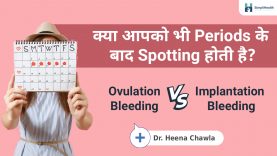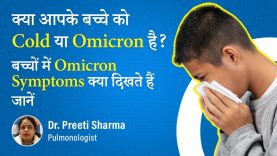Omicron Variant Symptoms & Causes | ओमिक्रॉन वेरिएंट के लक्षण और कारण | How bad is the Omicron Variant?
- 1.16K
- 2 years ago
Dr. Preeti Sharma
Dr. Preeti Sharma
Omicron Variant Symptoms | ओमिक्रॉन संस्करण कितना खराब है?
In this video SimpliHealth expert Pulmonologist Dr. Preeti Sharma is talking about Omicron Variant Symptoms & Causes and also she answered some common questions that people ask like:
- How bad is the Omicron Variant?
- Omicron Vs Delta variant?
How Deadly Is the Omicron Variant? | Omicron Variant Symptoms
This omicron variant has several limitations. Much more than the previous versions of the variant. And these mutations are mainly on the spike protein, which has resulted in various states of transmissibility by this virus. This omicron variant spreads much faster than any other previous variant. Therefore it was labelled as a variant of concern. It is much faster than the Delta variant and also than the other variants.
Omicron Symptoms
The symptoms caused by this variant are much more similar to the common cold which is experienced by the people in many ways. For example, scratchy throat, sore throat or running nose, stuffy nose, nasal congestion, fever with or without chills, headache, body aches, and a lot of muscle fatigue, as we have in a common cold. Based on the symptoms we cannot differentiate this variant from the common cold. Only testing can tell us whether we have the COVID-19 variant or not.
What is to be done when we have these symptoms?
So we have two kinds of tests available with us, these are the antigen test or the RT-PCR based tests. The antigen test is widely available these days. They are also provided as homekit, self testing kits which can be used by the people at home.
Antigen tests can be false negative in some patients; when the patients only have few symptoms or they test too early. You have contact with the patient and then you take the test with the help of the kit today, the result would be negative. Any negative antigen test has to go for a RT-PCR test if you have symptoms for the disease. Which is very very important. But in case the antigen test is positive there are very less chances of it being false positive. So once the test is positive you take yourself as a covid positive patient and follow the isolation and the further procedures.
Once it is negative you need to go for an RT-PCR testing, to confirm that you have the disease. If the RT-PCR is also negative then also there are 10 to 20% chances that you can be positive but the test shows negative. So you can go ahead with the testing within the next 24 to 48 hours again, if you have the persisting symptoms. So this is about the testing. Once you develop the symptoms you have to have this testing done.
Delta vs Omicron: How is omicron different from the Delta variant?
We all have seen the devastation caused by this delta variant in the second wave of the disease. Which we experienced last year. What we had seen was, it was really very lethal. The symptoms onset was very fast and the people progressed to severe disease in a very short span of time. So this did not happen with this virus.
Whatever reports have come up and whatever we have seen in our day-to-day practice till now is; this is a slow progressing virus, which has more of the upper respiratory tract involvement rather than the lower respiratory tract. So people do not have much of severity of the disease as compared to the delta variant. Moreover, the active period where the hospitalisation is required or you see the median time for hospitalisation of the patient has decreased in this wave of the pandemic. So this is the difference between the omicron and delta variants. The delta was very lethal. And we had very high mortality rates while we were facing the delta variant. We lost many doctors to the variant and lost many lives. But here we are able to manage it somehow and the severity is not that much.
Again if we come to the next point it could be because of the vaccination campaign also. Omicron can occur in a patient who is already vaccinated or has previously been infected with the virus. But the another thing is, the patient may not have a severe disease only the at-risk categories like the elderly, people who have heart diseases, diabetes, hypertension or any kind of a chronic lung disease, or immunocompromised state; these people, this category of people are more prone to have severe infection or they are more prone to have this kind of infection again even if they are vaccinated.
So this is the difference, omicron can infect any kind of vaccinated person, but the susceptibility rates are lesser for the people who are vaccinated. But for unvaccinated people it is very high. So it affects people who are unvaccinated. They are also having a bit of severe disease requiring hospitalisation. But it is manageable in this case.
So that’s why I would like to say that we need to have our covid-appropriate behaviour in all places as of now. Because omicron does not recognize people who are vaccinated or not vaccinated. So keep your mask on, keep a social distance, follow the covid appropriate behaviour, avoid gatherings, avoid crowds. And just fight with this wave of the pandemic. Thank you.















Comments (0)